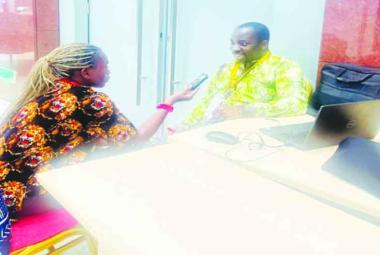By Zainab Jobarteh
Pregnancy excites mothers, even for the unplanned ones. There is a point where you look forward to holding your child in your arms. There is something about babies; you have to be a different kind of human for their arrival to not make you happy, especially if you have been trying to have one for a long time.
Then comes the part where mothers wonder if their babies will come out okay.
Sirreh Saho, 28, a final year Computer Science student at the University of The Gambia got married at the age of 22. She has a son, but before him, she had two miscarriages, so you can imagine what having him means to her—the rainbow baby.
‘’I had a cesarean delivery because my baby was huge,’’ she said. ‘‘And I always say this,’’ she continued, ‘‘when people go into surgery, they are freaked out and scared, and when they come out, they are drowsy, sad and gloomy. CS is the only surgery where you come out smiling because you know what is there for you. You have seen the beauty. From that day on, he stole my heart because I looked at him as the light at the end of the tunnel’’.
Like a child getting to play with her favorite toy after a long break, Sirreh looked blissful talking about the arrival of her son. I have never seen anyone’s eyes shine so bright when they talk about their child, until her.
She explained that she was constantly overdoing everything when the baby came. Following his milestones, making sure to know what is coming next or what he is supposed to achieve cognitively or developmentally. Taking the measures from when he knew how to sit, first step, first word. Most importantly, without fear of anything. It was just beautifully watching him grow.
Like every normal baby, her son had social ques.
‘‘When you smile at him, he smiles back. He had a million names. I call him Junior, his grandma calls him sweetheart and his aunties call him the boss baby, but he would identify with all of these names. Whatever he was called, he would respond to it,’’ she recounted.
She continued that around 8 months, there was a regression. He would not respond to his names, he is not interactive when people try to play with him and his social ques went missing. He said ‘dada’ (daddy) once, but he lost that too. He stopped making sounds or any kind of eye contact.
‘‘As he began to grow into 9-10 months, I told my family that something was wrong with him, but they said he was fine. Everyone around me said the same thing, so I convinced myself that he was okay,’’ she said.
But she knew; mothers always know. With everyone dismissing her thoughts, she went on to do research on the signs her son was displaying ‘‘and everything points to autism but there was this hope in me’’.
At one, Sirreh said the signs were just going forward until it got to a point where she realized that her son was not fully understanding verbal communication, so she insisted on seeing a doctor.
Unfortunately for them, there is not a single Pediatric Neurologist in The Gambia. They talked to different people, doctors, but nothing was there for her child.
It was like a reluctant rain. There were dark clouds above her head but Sirreh would not fully accept what was happening. She was in denial.
Then came the rain.
Dr. Allen came to The Gambia. A child psychiatrist either from America or England, she could not remember, but works at The Westfield Clinic
‘‘She had a session with him, evaluated him and said to me ‘whatever you think is actually true, but I do not know how to help you because there is little I can do while I am here.’ Then she gave me tips on how to do at least the bare minimum to help my child.’’
How did you feel? I asked.
‘‘Gloom,’’ she responded.
‘‘I was afraid of what the future is going to hold for him. It is not even about the autism; it is about how scary the world is going to be for him. I know our society. I know how we think. I know how we interact with people that have even a little disability. We are not tolerant. Until this day, it is like my biggest fear. My fear is what the world holds for my son. How are they going treat him? I am afraid they would punish him for being him. They would not understand that he is different, that he has a different operating system. I am afraid of how he will be looked at less because he has a different operating system from the rest of us,’’ she cried.
Sirreh is feisty, a bit intimidating. The type that would say ‘‘hold my bag’’ and then starts a fight. But at this point in our interview, she looked vulnerable. Her voice became hoarse and she tried to fight back her tears, but they came anyway. She cried.
You would think writing stories like this would be easy until you realize there is not much knowledge on autism in the country. You cannot have an expert’s opinion, and because you would not want to leave your readers wondering what autism is, you need to do a lot of googling. I do not think I have ever had to use google this much my entire life.
According to Center for Disease Control and Prevention US (CDC), Autism Spectrum Disorder (ASD) is a developmental disorder caused by differences in the brain. People with ASD often have problems with communication and interaction, and restricted or repetitive behaviors or interests. People with ASD may also have different ways of learning, moving or paying attention.
They also gave examples of some social communication and social interaction characteristics related to autism.
Avoids or does not keep eye contact
Does not respond to name by 9 months of age
Does not show facial expression like happy, sad, angry and surprised by 9 months of age
Does not play simple interactive games by 12 months of age
Uses fewer or no gestures by 12 months of age
Does not share interest with others by 15 months of age
Does not point to show you something by interesting by 18 months of age
Does not notice when others are hurt of upset by 24 months of age
Does not notice other children and join them in play by 36 months of age
People with ASD have behaviors or interests that can seem unusual. These behaviors or interests set ASD apart from conditions defined by problems with social communication and interaction only. Examples are:
Lines up toys or other objects and gets upset when order is changed
Repeats words or phrases over and over (called echolalia)
Plays with toys the same way every time
Is focused on parts of objects (for example, wheels)
Gets upset by minor changes
Has obsessive interests
Must follow certain routines
Flaps hands, rocks body, or spins self in circles
Has unusual reactions to the way things sound, smell, taste, look, or feel
Other characteristics include:
Delayed language skills
Delayed movement skills
Delayed cognitive or learning skills
Hyperactive, impulsive, and/or inattentive behavior
Epilepsy or seizure disorder
Unusual eating and sleeping habits
Gastrointestinal issues (for example, constipation)
Unusual mood or emotional reactions
Anxiety, stress, or excessive worry
Lack of fear or more fear than expected
It is important to note that children with ASD may not have all or any of the behaviors listed as examples here.
The boy is now 4, and though he does not have all of these behaviors combined, he has some. He does not speak. He is hyperactive, to the point his mother had to stop going to social events at some point ‘‘because he has sensory needs and is always all over the place’’.
‘‘He is running, he is sprinting, he does not want to be around people. It was very difficult for me to adjust to that because we have to go to social events, that is our culture. If you do not go, then there is a problem. But then when I take my son with me, he is not comfortable. Then I realized, what is the need? I understand that these people want us to be at their events, but what is the need if my baby is not okay being there? I do not want to subject him to situations like that’’.
She continued that he likes the sound of bowls hitting the floor so he would just start dropping bowls in the house. He also likes playing with doors, banging them. He loves toys, fascinated by them. He would arrange his toys and play with them, but easily gets bored and move on to jumping all over the house.
‘‘He also has sensory needs. There are times when he does not want to wear his shoes or clothes. From intensive reading, I have realized that it gives him a burning sensation. Sometimes, he would hold his ears, I have learned through reading that it could be something as simple as chewing that irritates him’’.
He is also a picky eater, so his mother finds it difficult to give him other types of food apart from his favorite, ‘‘orgie’’.
On the strategies she has found effective fostering communication between them, Sirreh said she had to be patient and simple. She speaks to him in simple language and when he does not catch up as quickly as expected, she would tell him ‘‘your time, baby. Whenever you are ready’’.
It is incredible how far a mother would go to make sure her child is okay. Sirreh even resigned from her job to spend more time with her son.
When I asked how she prioritizes self-care and well-being while being a parent to an autistic child, she responded, ‘‘there is no self-care. Everything revolves around him. Everything is about him’’.
From struggling to find him resources that would help him reach his full potential, to finding him a befitting school—a school that would accept him as well as cater to his needs, Sirreh talked about her child with joy, with zero pity, with acceptance and contentment.
Recounting on how certain schools rejected her son because of the behavioral issues children on the spectrum have, Sirreh said she does not blame them now because it is difficult to take care of autistic children when you do not have enough resources at your disposal.
‘‘Taking care of them is hard, he is my son and I love him to death, but some days I just need a break’’.
Nothing prepares you for the struggles you are likely to encounter when you have a child, but when you have an autistic child, that is a different kind of struggle. You need community to pull through.
Though her community became smaller as her child grows, Sirreh said she has found constant help and support from her family, internet friends and the school he goes to, Trankil Academy.
Her goal is not to change her son, but to help him grow into a well-educated responsible man.
She has a piece of advice for mothers with autistic children; ‘‘it is okay to feel sad. It is okay to feel your world is turning around. It is okay to cry. It is okay to talk about it. It is important to know when to kick out of that and not make life about you. Exercise patience, put your children first and put yourselves last’’.
On the difficulties of the lives of autistic children, Sirreh has this to say; ‘‘imagine you have a lot of feelings bottled up and you cannot say it, you cannot communicate. Imagine you have a wound, nobody knows about it and you do not have the means to communicate it to people. It is frustrating. Now, an autistic child has so much he or she wants to say, but they cannot say it’’. This, she pointed out is the scariest part about autism to her ‘‘because I feel somebody can hurt my child and he would not be able to tell me’’.
The question now is, in terms of health care and education, what does the future hold for autistic children in The Gambia, especially those from less privileged homes?





